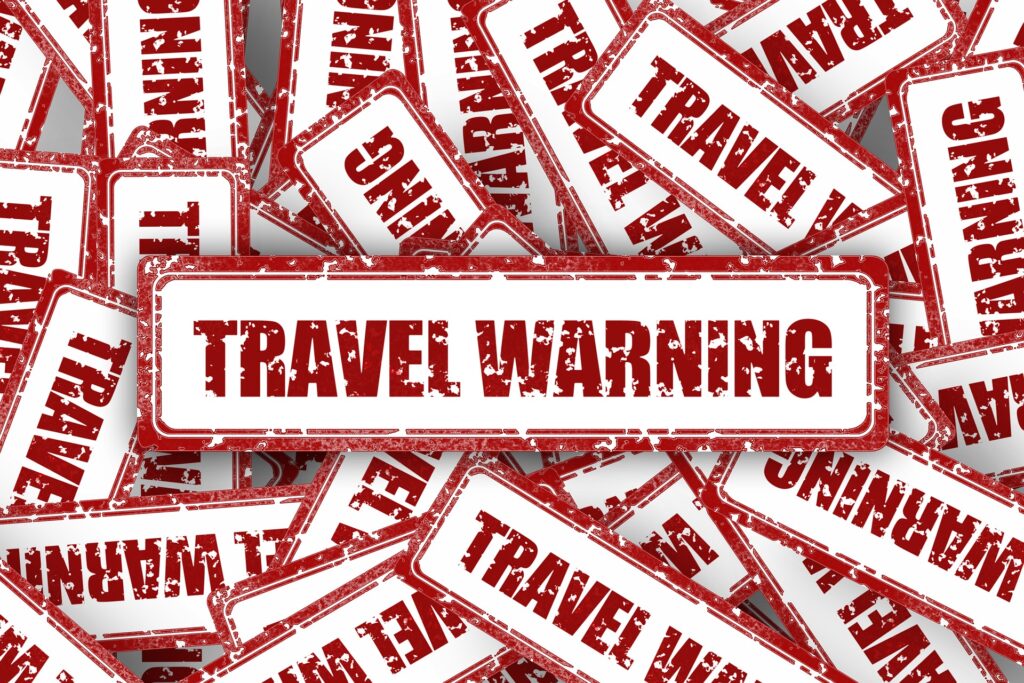Understanding U.S. State Department Travel Warnings and Travel Alerts

The ability to travel and enjoy the world is one of the most enriching experiences one can have. However, world events like civil unrest, pandemics, war and crime threatens our health and safety. As travelers it is imperative that we stay informed about a country’s social climate and any conflict that may arise before we travel and during our stay.
The U.S. State Department provides American citizens with regular notifications of events that may affect their safety and security. These notices come in the form of Travel Alerts or Travel Warnings.
What are Travel Warnings?
The U.S. State Department issues travel warnings to Americans to recommend they avoid travel to a particular country because it has been deemed unstable or dangerous. The State Department may also issue a travel warning when the U.S. government closes its consulate or embassy in that country. The travel warning may also get issued when the government building reduces its diplomatic staff, and there may not be able to assist the traveling Americans.

The travel warnings may be issued for the ongoing conflict, such as civil war, severe spikes in crime, public health, or geopolitical risks. Travel warnings are ranked on a scale from one to four:
- 1: Exercise normal caution
- 2: Exercise increased caution
- 3: Reconsider travel
- 4: Do not travel
What are Travel Alerts?
The U.S. State Department issues travel alerts as a cautionary notice for short-term conditions that can be a potential risk to the safety and security of U.S. citizens. Some of these conditions include:
- Natural disasters
- Political demonstrations
- Terrorist attacks
- International conferences or events
Travel alerts don’t tell people to cancel their plans, but they inform them of the potential risks in that region. Dangerous weather conditions are a common cause of travel alerts getting issued.

Smart Traveler Enrollment Program
The U.S. State Department developed an app called the Smart Traveler Enrollment Program (STEP). When you register, you will receive up-to-date information on any emergency or developing situation in the country you’re traveling to. The STEP program is free to all traveling U.S. citizens and nationals to assist them in an emergency for their safety and security.
There are three benefits of enrolling in STEP:
- Get vital information from the embassy about the current and potential safety conditions in the destination you are traveling to, so you can decide whether or not to travel.
- The embassy can contact you if there is an emergency, whether it is a natural disaster, political climate, or civil unrest.
- Family and friends can get in touch with you should there be an emergency.
When countries began closing their bounders in early 2020 due to COVID-19, the STEP program helped evacuate over 100,000 travelers and expats.
A responsible traveler is an informed traveler. Be a smart traveler and use the resources available to research the areas you’re going to and plan your trip accordingly. Have a plan of action should there be a safety issue, and ensure a loved one keeps track of your movements.
Book Your Travel to ANY Destination
Search, compare and book hotels & rentals at the best prices that are sourced from a variety of platforms including Booking.com, Hotels.com, Expedia, Vrbo, and more. Search for ANY destination by clicking in the upper left corner of the map.


Tonya Fitzpatrick, Esq. is co-Founder of World Footprints, a social impact travel storytelling content hub she runs with her husband, Ian, that has been recognized as Best Social Impact Travel Media Company by CEO Monthly. She is an award-winning travel and business journalist, global public speaker, and 3-time TEDx speaker. Tonya regularly shares her insights on career transitions, DEIA in travel and the transformative power of travel to audiences all over the world. Recognized as Black Travel Journalists of the Year—an honor she shares with Ian, Tonya contributes her time and leadership to several boards and commissions in the travel community including SATW, The Explorers Club (DC), North American Travel Journalists Association (NATJA) and JourneyWoman. Tonya has been appointed to the Maryland Tourism Development Board by Gov. Wes Moore.

